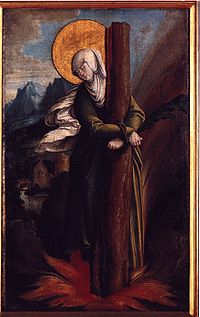
Feastday: August 5
Death: 304
Martyr and penitent, listed in some records as the daughter of the king of Cyprus. Afra was caught up in the persecutions of Emperor Diocletian in Roman Augsburg. She is listed in the Martyrology Hieronymianum. Afra possibly operated a brothel in Augsburg or served as a prostitute in the temple of Venus, living with her mother, Hilaria, and serving women Eunomia, Eutropia, and Digna. When the persecutions started in Augsburg, Bishop Narcissus of Gerona, Spain, arrived in the city and took lodging with Afra and Hilaria, not knowing their profession. His holiness attracted the women, who converted. When officials came looking for the bishop, Afra hid him under a pile of flax. Afra and her household were baptized, and her uncle Dionysius was ordained as a bishop. Arrested, Afra was burned to death, tied to a tree on the small island of Lech. She was buried in Augsburg and her mother erected a chapel for her tomb. Soon after, Hilaria and her serving women were burned alive in their house. Afra's remains were buried in a church named after her. Pilgrims visited her shrine as early as 565. In 1012, the Benedictine monastery of St. Ulrich and St. Afra displayed her sarcophagus. The Acts of Afra give an account of her martyrdom.
Free Online Catholic Classes for Anyone, Anywhere
All Free Classes Live Lessons Catholic Knowledge Quiz Confession Classes Bible Classes Catechism Classes Grade 1 Grade 2 Grade 3 Grade 4 Grade 5 Grade 6 Grade 7 Grade 8 High School Rosary Classes Way of ChristChristian martyr "Afra" redirects here. For other uses, see Afra (disambiguation).
Saint Afra (died 304) was martyred during the Diocletian persecution. Along with Saint Ulrich, she is a patron saint of Augsburg. Her feast day is August 7. Afra was dedicated to the service of the goddess, Venus, by her mother, Hilaria. Through his teachings, Bishop Narcissus converted Afra and her family to Christianity. When it was learned that Afra was a Christian, she was brought before Diocletian and ordered to sacrifice to the pagan gods. She refused, and was condemned to death by fire.
Biography
 Tomb of Saint Afra in Augsburg
Tomb of Saint Afra in Augsburg
Although many different accounts of her life exist, the most widely known is The Acts of St. Afra, which dates from the Carolingian period (8th century AD). In the opinion of most critics this is compilation of two different accounts, the story of the conversion of St. Afra, and the story of her martyrdom. The former is of later origin, and is merely a legendary narrative of Carolingian times, drawn up with the intention of connecting with St. Afra the organization of the church of Augsburg.
In the late 3rd century, her pagan family journeyed from Cyprus to Augsburg. Afra was dedicated to the service of the goddess, Venus, by her mother, Hilaria. According to this source, she was originally a prostitute in Augsburg, having gone there from Cyprus, maybe even as the daughter of the King of Cyprus. She is reputed either to have run a brothel in that town or worked as a hierodule in the Temple of Venus. As the persecution of Christians during the reign of Roman Emperor Diocletian began, Bishop Narcissus of Girona (in Spain) sought refuge in Augsburg and lodged with Afra and her mother, Hilaria. Through his teachings, Bishop Narcissus converted Afra and her family to Christianity.
She continued to hide the bishop from the authorities. When it was learned that Afra was a Christian, she was brought before Diocletian and ordered to sacrifice to the pagan gods. She refused, and was condemned to death by fire on a small island in the Lech River, with her remains being buried at a distance from the place of her martyrdom. Her mother and her maids (viz., Ligna, Eunonia, and Eutropia) later suffered the same fate, for interring her in a burial vault.
According to an alternative account in an earlier document, Afra was beheaded, rather than having been burned. The Martyrologium Hieronymianum (a compilation of martyrs) mentions that Afra "suffered in the city of Augsburg" and was "buried there". Her feast day is August 5.
According to Carl Egger, it appears that the author of the passio blended the account of Afra with that of Venerea, a martyr of Antioch, who is mentioned on the same day in the Martyrologium Hieronymianum. Contrary to this, other ancient calendars portray Afra as a virgin.
Legacy
St. Ulrich's and St. Afra's Abbey, Augsburg (German: Kloster Sankt Ulrich und Afra Augsburg) is a former Benedictine abbey dedicated to Saint Ulrich and Saint Afra in the south of the old city in Augsburg, Bavaria. From the medieval Saint Afra's church in Meissen, the name passed via a former monastery of the Canons Regular to the current Sächsisches Landesgymnasium Sankt Afra zu Meißen, a boarding school in Saxony.





